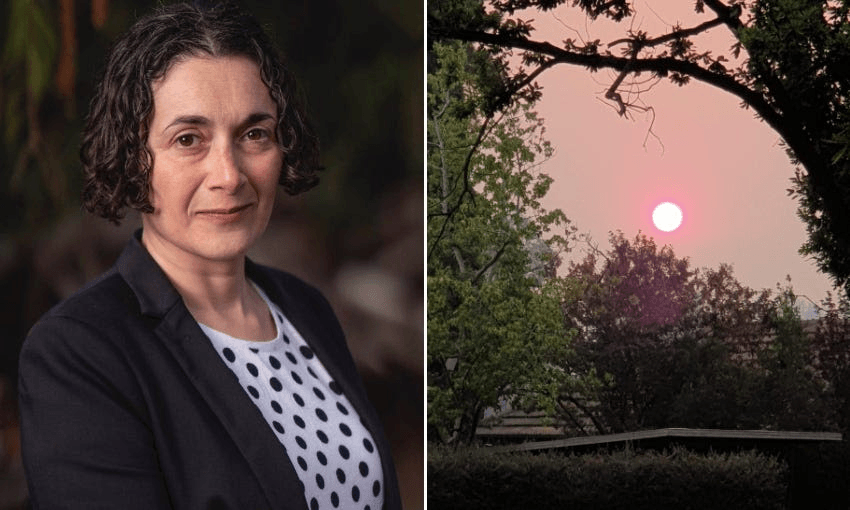‘The fight for a habitable planet is on right now, and we need everyone to show up.’ Ellen Rykers gets a reality check from climate scientist Joëlle Gergis.
This is an excerpt from our environmental newsletter Future Proof. Sign up here.
In the summer of 2019, an acrid fug of smoke cloaked the city of Canberra, where I was living at the time. The heat was oppressive – pushing 40 °C – and a bushfire haze turned the sun into an angry red orb. I tried not to leave my air-conditioned office: the air outside was choked with specks of incinerated eucalypt. I googled where I could buy an air pollution mask.
It was the beginning of the Black Summer, when catastrophic bushfires raged through 243,000 square kilometres of Australia. That’s a mind-boggling number equivalent to 90% of New Zealand’s landmass. Infernos killed 34 people and an estimated three billion animals. The iconic koala was pushed onto the endangered species list.
“I never imagined I’d live to see the day when the koala has the potential to become extinct in our country,” says Joëlle Gergis, an Australian climate scientist.
Gergis, too, was in Canberra that Black Summer. She was deep in the throes of writing for the Intergovernmental Panel on Climate Change (IPCC) 6th assessment report – a comprehensive synthesis of everything we know about the science of climate change.
“These things we were writing about in the report were literally happening outside my window,” she says. A lot of scientists, people just like her, assumed that the big, meaty reports, the science, would speak for itself. But this was a wake-up call: “In fact, no, it doesn’t speak for itself. And unless you get out there and say something, people will fill the gap.” Gergis wanted to tell the true, scientific climate story and help everyone connect the dots.
The scientific reality
In an impassioned address at the Climate Change and Business Conference on Monday, she laid bare the scientific reality we’re experiencing – not just what’s coming 20, 30 years down the track, but what’s happening now.
The record-breaking heat of 2023, both on land and in the oceans, that’s likely to be surpassed again in 2024. The 2022 coral bleaching that dealt the “death blow” to the Great Barrier Reef. The signs of abrupt change in Antarctica, where the melting of the West Antarctic ice sheet could raise sea levels by four metres, shift ocean circulation, and fundamentally alter global weather patterns.
“I just can’t believe that we are going to literally destabilise the Earth’s climate and, yet, we are making excuses, trying to rationalise the use of fossil fuels,” Gergis tells me.
About 80% of the excess carbon in the atmosphere has come from us burning fossil fuels, she points out. The rest comes from the destruction of carbon-storing ecosystems like wetlands and forests. “No matter which way you want to look at it, it’s the burning of coal, oil and gas that’s really cooking the planet,” she says.
About half of all of that planet-heating carbon accumulating in the atmosphere has been pumped out since 1990 – the year the very first IPCC report was released.
‘Policy failure of colossal proportions’
Having studied, taught and researched climate change for close to 30 years, Gergis thought we’d be just a bit closer to an adequate political response to this existential threat. Instead, she describes what we have as “a policy failure of colossal proportions”.
At the Cop28 climate summit last year, a “global stocktake” assessed where we’re at collectively with our global climate goals. It was sobering: the world is on track to reduce emissions by 2%, not the 43% we need by 2030 to limit warming to as close to 1.5°C as possible.
Instead of effective policies, decision-makers have been reeled in by fossil fuel talking points. Gergis is scathing of Australia’s approach to using gas as a “transition fuel”, likening switching from coal to gas to swapping cigarettes for vapes. New Zealand’s imminent reversal of its oil and gas exploration ban is “a step backwards” too: “It’s clear that Australia’s lack of genuine leadership on climate change is influencing New Zealand’s energy policy and encouraging us to turn our back on our Pacific Island neighbours,” she told the conference audience.
And we can’t rely on as-yet-unproven carbon capture tech, either. Currently deployed carbon capture technology – which sucks carbon out of the atmosphere and stores it – can only offset about 0.01% of global emissions. Gergis labels it “a reckless gamble with our planet’s future” – especially when safe alternatives already exist.
“We could actually reduce global emissions between 50 to 80% by 2030 with existing technology. So we don’t actually need to wait for anything to materialise. We can do it right now,” she says.
Rage and hope in the age of consequences
In 2022, Gergis published a book called Humanity’s Moment: A climate scientist’s case for hope. The “hope” subtitle is “a little bit funny if you know me really well,” she says. (Her recent essay, Highway to hell, might seem more on-brand.) But Gergis is adamant that hope is essential, an active choice we should all make in the face of this confronting reality.
You can give yourself permission to feel emotional about climate change too. Gergis says she’s been “getting in touch with her rage”. Likewise, despair is an appropriate emotional response to “very distressing information.” But we can’t leave ourselves wallowing in doom.
“We need to use that despair, that care for the planet, as our fuel for rage and anger and action. This is not the age of apathy. This is the age of consequences. We will look back at the 2020s and say, ‘Well, where were you? What did you do? How did you show up?’
“The fight for a habitable planet is on right now, and we need everyone to show up.”
